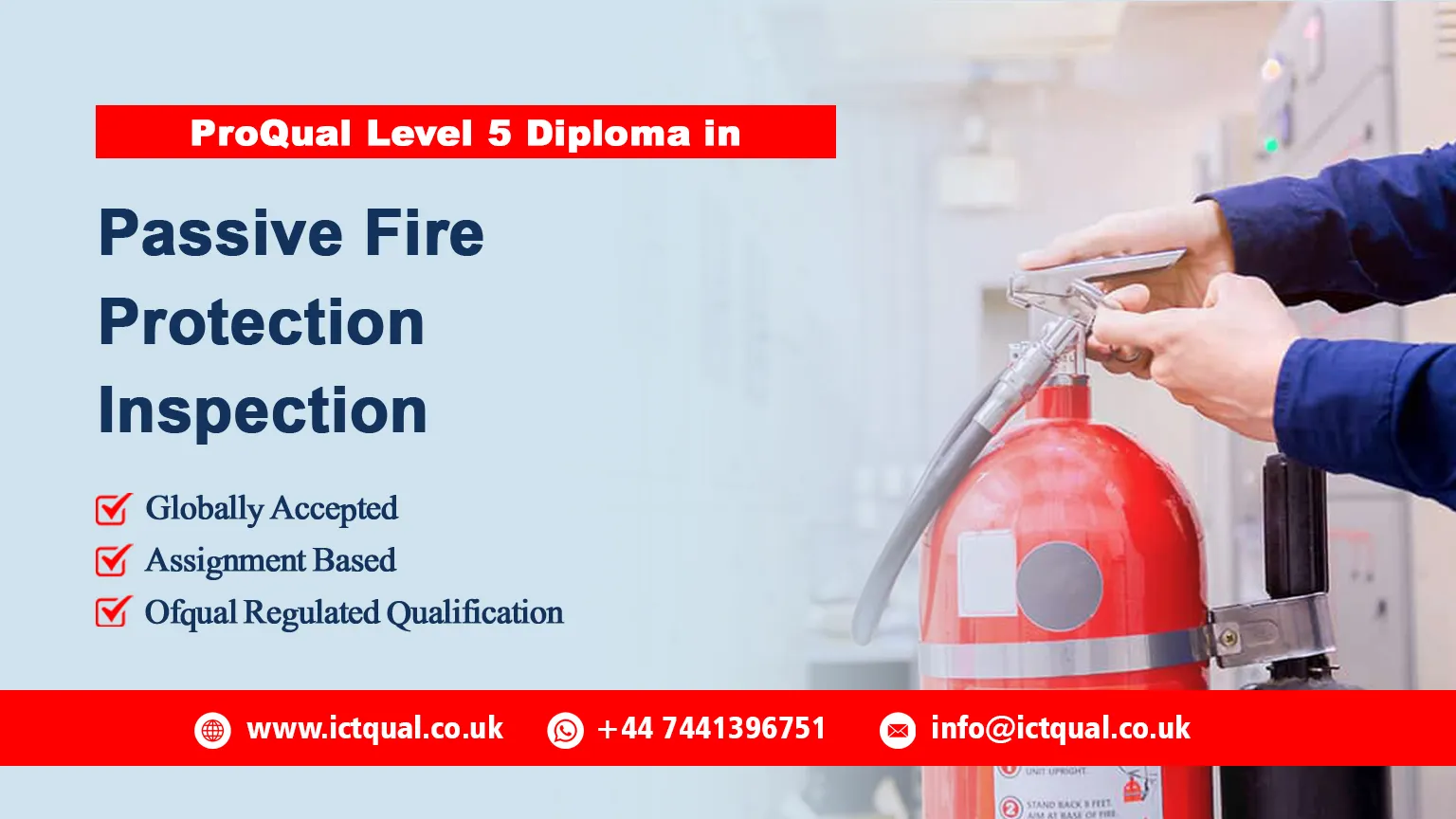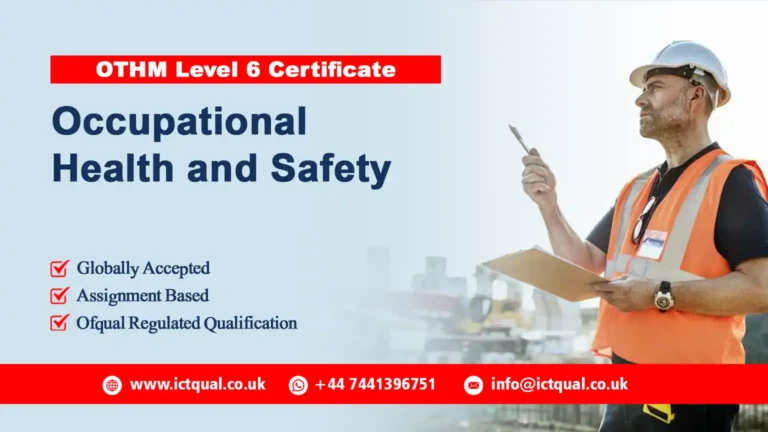In the realm of construction and safety, the ProQual Level 5 Diploma in Passive Fire Protection Inspection stands as a crucial qualification for professionals dedicated to fire safety. This diploma equips candidates with the necessary skills and knowledge to effectively assess and implement passive fire protection measures, ensuring compliance with safety regulations and standards.
Passive fire protection (PFP) refers to the integral design features of a building that help contain fires and prevent their spread. These measures include fire-resistant walls, floors, doors, and ceilings, which are essential for safeguarding occupants and minimizing property damage. By obtaining a Level 5 Diploma in Passive Fire Protection Inspection, professionals can enhance their understanding of these systems and their importance in fire safety management.
The ProQual Level 5 Diploma is recognized for its rigorous standards and comprehensive curriculum. This qualification is designed for experienced professionals who already have a foundational understanding of fire safety and seek to deepen their expertise. The course covers essential topics such as fire risk assessments, regulatory frameworks, and the evaluation of passive fire protection systems. By earning this diploma, individuals can significantly boost their career prospects in the fire safety industry.
Earning the ProQual Level 5 Diploma opens doors to numerous career opportunities within the fire safety sector. Graduates can pursue roles such as fire safety consultants, inspectors, and compliance officers. These positions not only offer competitive salaries but also provide the opportunity to make a meaningful impact on public safety and building compliance.
The ProQual Level 5 Diploma in Passive Fire Protection Inspection is an essential qualification for professionals aiming to excel in the field of fire safety. With its comprehensive curriculum and focus on practical skills, this diploma empowers individuals to enhance their careers while contributing to safer building environments. If you’re ready to take the next step in your professional journey, consider enrolling in this prestigious program to become a leader in passive fire protection.
The ProQual Level 5 Diploma in Passive Fire Protection Inspection is an advanced qualification designed for professionals seeking to deepen their understanding and expertise in the field of fire safety. This course provides a comprehensive framework for evaluating, implementing, and maintaining effective passive fire protection measures within various types of buildings.
Participants will be assessed through a combination of written assignments, practical evaluations, and case studies. Successful completion of all assessments will lead to the award of the ProQual Level 5 Diploma in Passive Fire Protection Inspection, signifying a high level of competency in the field.
Holding the ProQual Level 5 Diploma enhances career prospects and positions individuals for roles such as fire safety consultants, inspectors, and compliance officers. Graduates will be equipped to take on responsibilities that directly impact fire safety and building compliance, contributing to safer environments for all.
The ProQual Level 5 Diploma in Passive Fire Protection Inspection is a vital qualification for those serious about advancing their careers in fire safety. By providing in-depth knowledge and practical skills, this course prepares participants to effectively manage and inspect passive fire protection systems, ensuring the safety and compliance of building environments. Enroll today to take the next step in your professional journey in fire safety.
The ProQual Level 5 Diploma in Passive Fire Protection Inspection, achieve the qualification candidates must achieve each of the mandatory units, plus a minimum of two of the optional units:
Mandatory Units
Mandatory Units – complete all units
| Unit Title | Level | GLH |
| Building Control Site Inspection and Plan Assessment | 5 | 150 |
| Monitor Project Quality in Construction – Passive Fire Protection | 5 | 145 |
Optional Units – complete a minimum of two units
| Unit Title | Level | GLH |
| Inspecting and Testing of Fire Resisting Door Installations | 3 | 30 |
| Inspecting and Testing of Fire Stopping Installations | 3 | 30 |
| Inspecting and Testing of Fire-Rated Ductwork and Damper Installations | 3 | 30 |
| Inspecting and Testing of Fire-Rated Steel Intumescent Coating Installations | 3 | 30 |
The ProQual Level 5 Diploma in Passive Fire Protection Inspection is tailored for a range of professionals in the fire safety and construction sectors. It is particularly suitable for:
- Fire Safety Professionals: Individuals working in fire safety roles who wish to enhance their expertise in passive fire protection systems and improve their inspection skills.
- Building Inspectors and Surveyors: Professionals responsible for assessing building safety and compliance who need a deeper understanding of passive fire protection measures.
- Compliance Officers: Those tasked with ensuring that organizations adhere to fire safety regulations and standards, looking to expand their knowledge and capabilities in passive fire protection.
- Health and Safety Managers: Professionals focused on workplace safety who need to understand fire protection measures as part of their overall safety strategy.
- Construction Managers and Site Supervisors: Individuals involved in construction projects who want to integrate effective passive fire protection solutions from the outset.
- Fire Risk Assessors: Those conducting fire risk assessments seeking to specialize in passive fire protection systems and their effectiveness.
- Engineers and Architects: Professionals in design and engineering roles who need to consider passive fire protection in their projects and designs.
- Career Changers: Individuals with a background in related fields, such as engineering or safety management, who are looking to transition into fire safety and specialize in passive fire protection.
This diploma is ideal for anyone aiming to advance their career in fire safety, enhance their technical knowledge, and contribute to safer building practices through effective passive fire protection strategies.
Upon successful completion of the ProQual Level 5 Diploma in Passive Fire Protection Inspection, participants will achieve the following learning outcomes:
- Comprehensive Understanding of Passive Fire Protection: Demonstrate a thorough understanding of passive fire protection principles, including the various types of systems and materials used in construction to contain and control fire spread.
- Knowledge of Regulatory Requirements: Identify and interpret relevant legislation, codes, and standards pertaining to fire safety and passive fire protection, ensuring compliance in inspections and assessments.
- Risk Assessment Proficiency: Conduct detailed fire risk assessments, identifying potential hazards and evaluating the effectiveness of existing passive fire protection measures in diverse building environments.
- Inspection Techniques: Apply effective inspection methodologies to assess the integrity and performance of passive fire protection systems, including fire-rated walls, doors, and other barriers.
- Practical Application of Skills: Utilize case studies and real-world scenarios to apply theoretical knowledge, demonstrating the ability to implement best practices in passive fire protection inspections.
- Reporting and Documentation Skills: Prepare clear and comprehensive reports on inspection findings, including recommendations for improvements and compliance measures, to communicate effectively with stakeholders.
- Critical Thinking and Problem-Solving: Develop critical thinking skills to analyze complex fire safety issues, enabling effective decision-making and problem-solving in various situations related to passive fire protection.
- Commitment to Continuous Improvement: Foster a mindset of continuous professional development, recognizing the importance of staying updated with advancements in fire safety practices and technologies.
By achieving these learning outcomes, participants will be well-equipped to enhance their careers in fire safety and contribute meaningfully to the protection of lives and properties through effective passive fire protection measures.







